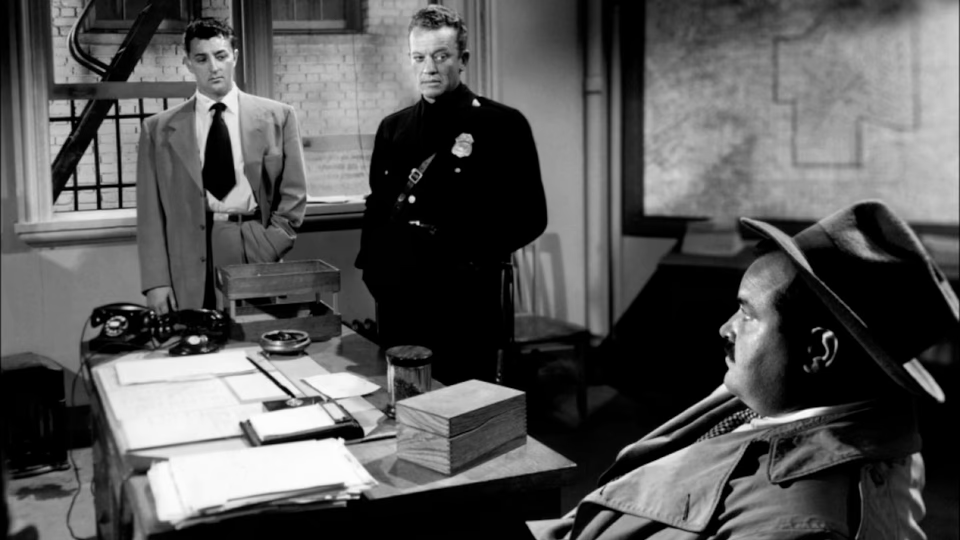The Racket

Howard Hughes’ RKO Studios produced this crime drama that sees Robert Mitchum play McQuigg, an honest police chief determined to bring down hotheaded gangster Nick Scanlon, played by Robert Ryan.
Based on a 1920s stage play previously adapted in a 1928 silent film—also produced by Hughes—the movie shows its antiquated roots early, opening with an exposition dump explaining how a new syndicate led by the mysterious “old man” is pushing into the city, taking over the existing rackets.
But the film surprises with its modern sensibilities when we meet the old man’s go-between, Connolly, an icy bureaucrat played by Don Porter. His low-key, smile-hiding-sharp-fangs demeanor feels like the Sydney Greenstreet role evolved for corporate America.
Then the film introduces Mitchum, inspecting his new station while giving the “I run an honest precinct” speech. Seeing Mitchum as the boss of a large organization feels wrong. He’s not the boss; he’s a loner, or at least the head of a small crack squad operating within a larger corrupt organization.
But as the film settles in, the precinct fades into the background. Mitchum partners with a junior officer named Johnson, played by William Talman. Early on, Talman catches on to the racket’s influence.
Johnson: Captain, am I dumb or is someone trying to cover up something?
McQuigg: When I think you’re dumb, Johnson, I’ll let you know.
The script teems with this kind of crackling dialogue. As Mitchum and Talman set about making things tough for Ryan, Mitchum has Talman pick up Ryan’s brother, Joe.
McQuigg: Pick him up quietly.
Johnson: What’s the charge, sir?
McQuigg: Oh… vagrancy.
Johnson: Yes, sir.
(Talman starts to leave)
McQuigg: If he resists, there’s a city ordinance against expectorating on public pavement.
Johnson: That includes expectorating broken teeth, sir?
McQuigg: Oh yeah, that’s very unsanitary.
Even the old desk sergeant gets some good lines. As he books Joe, he says, “A receipt for your toys, sonny.” Then, admiring Joe’s pocket pistol, “My granddaughter could use that for a paperweight, in her kin-dee-garden.”
Lizabeth Scott plays a nightclub singer involved with Joe, who finds herself thrown over for a stolen car rap. Seeing an opportunity, Mitchum leans on her to testify against Ryan. This sets up the final showdown between Mitchum and Ryan.
They make good antagonists. Mitchum is his usual laconic self, all weary calm, while Ryan is all glaring menace and impulsive rage. There’s an underdeveloped theme of both men struggling with changing times. For Ryan, it’s the mob’s new bloodless approach; for Mitchum, it’s the blatant, accepted corruption. They’re cut from an era where the good guys wore white and the bad guys wore black, and now everyone wears gray. The script hints at them having a shared backstory but avoids contrivances. Instead, their personas evoke the question of an unstoppable force meeting an immovable object. I’m not sure who I’d pick in a fistfight.
Rounding out the cast, William Conrad shines as a smarmy detective on the take who may have inspired the Lieutenant Eckhart character in Tim Burton’s Batman.
Indeed, the film teeters on the precipice of greatness and features one scene I won’t spoil, but it was a terrific shot that delivered a genuine jolt of surprise and upped the emotional and narrative stakes. But like Roger Ebert often said, a good movie needs “three good scenes and no bad ones.”
Ebert attributed this quote to Howard Hawks1, who should have directed this picture. This kind of story fits square in his wheelhouse, and you can imagine frequent collaborator Walter Brennan as the aforementioned desk sergeant.
It even features a Hawksian woman in the form of Joyce Mackenzie, who plays Mitchum’s wife. After a failed assassination attempt on Mitchum leaves them both shaken and their house in disarray, the script avoids the trope of having her fall into hysterics. Instead, when Mitchum offers to take her to her sister’s, she says with firm calm, “Nobody’s gonna drive me out of my own home in your district. Get on with your cleaning, and I’ll get on with mine.”
Hawks wouldn’t have changed everything. The film already eschews any overt softness or sentimentality. He would have brought some of his trusted writers—think Ben Hecht, William Faulkner, Philip Epstein, Jules Furthman, maybe even Leigh Brackett—to punch up the script. Under his direction, they’d have kept the aforementioned scene, reshaped a few others to make them as good, and scrapped the early exposition dump. They would have beefed up the underdeveloped theme of Ryan and Mitchum being men out of their times, allowing Hawks to frame the film in contrast to his 1932 collaboration with Hughes, Scarface. While Scarface showed bad guys like Ryan climbing the underworld ladder through violence and good guys like Mitchum fighting them, this film could have positioned both archetypes as outmoded.
With the script fixed, Hawks would then turn to the performances, toning down Ryan a notch. He’d have Ryan keep the menace and rage, but below the surface, always bubbling, threatening to erupt. This would render him less stereotypical and more chilling, closer to the Connolly character but far more dangerous.
But Hawks directing is a pipe dream. In 1951, he was neck-deep in post-production of another RKO film, The Big Sky which would underperform, snapping a hit film streak spanning thirteen years. A shame, as Hawks’ talent and The Big Sky’s bigger budget would have been better served here. The Racket is good; Hawks could have made it great.
Notes
-
Ebert loved this quote. It shows up in his reviews of Red Eye, Mission to Mars, and Pulp Fiction, to name a few. Except, Howard Hawks never said it. The closest Hawks came was telling John Wayne on Red River, “Duke, if you can make three good scenes in this picture and don’t annoy the audience the rest of the time, you’ll be good.” (Joseph McBride, Hawks on Hawks (United States: University Press of Kentucky, 2013) 36) ↩︎